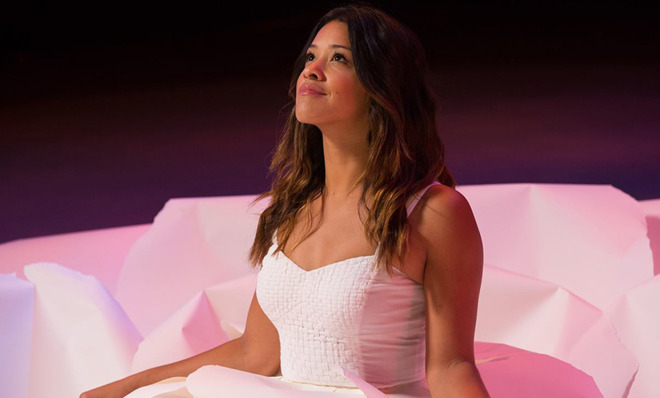The surprising feminism of Jane the Virgin
Jane the Virgin might sound like the kind of comedy Sean Hannity would show his daughter, but buried inside is a powerful message


A free daily email with the biggest news stories of the day – and the best features from TheWeek.com
You are now subscribed
Your newsletter sign-up was successful
Forgive me for initially ignoring Jane the Virgin.
As a recent study from the Pew Research Journalism Project reminds us, our politically polarized news sources have us seeing everything and everyone through a partisan lens. Environmentalist? You must hate Republicans. Anti-abortion? You aren't concerned with women's rights. Virgin by choice? Fox News watcher, for sure.
Thank goodness then for shows like The CW's Jane the Virgin that remind us that we are not a nation of deeply partisan animals, but complicated individuals with mixed ideological views. (In fact, Pew found that only about 20 percent of us are either staunch liberals or conservatives.) Jane might be a virgin, but one could hardly write her off as brainwashed by the religious right. Instead, she's a central part of what is surprisingly the most feminist new show on television this fall.
The Week
Escape your echo chamber. Get the facts behind the news, plus analysis from multiple perspectives.

Sign up for The Week's Free Newsletters
From our morning news briefing to a weekly Good News Newsletter, get the best of The Week delivered directly to your inbox.
From our morning news briefing to a weekly Good News Newsletter, get the best of The Week delivered directly to your inbox.
The new comedy, which is based on a Venezuelan telenovela, manages to be a hilarious send-up of the melodrama soap operas while at the same time featuring characters who appear to have earnest intentions and true affection for their friends and family. At the center is Jane, a virgin accidentally artificially inseminated by her Ob-Gyn, who, as it happens, is the sister of the owner of the hotel that Jane works at and who, as it happens, Jane once shared a memorable kiss with a few years back. Did we mention Jane is engaged to a detective, who is looking into the hotel owner's wife? Lucky for us, we have a baritone-voiced narrator who walks us through the many coincidences that fuel the plot, serving as one big knowing wink.
When I first heard about the show I instinctively wrote it off. What interest would an urban liberal like myself have in a show about virgins? Better to stick with the sex-positive ladies of Girls or Sex and the City. Chastity is a terribly outdated concept that associates a woman's moral worth with her sexuality. I didn't need to waste my time on a show with such a central plot device.
Then the good reviews started pouring in, praising the show as a "sweet surprise" that is very funny. I decided to give it a try — and it turns out Jane the Virgin is nothing like I expected.
Yes, the main character is a virgin because Jane's Spanish-speaking abuela said her virginity was a special gift and that losing it would alter her very being. But Jane is not only a virgin.
A free daily email with the biggest news stories of the day – and the best features from TheWeek.com
She is a young woman with a strong internal compass that propels her towards her professional aspirations of teaching and writing, as well as her romantic ones. She is not waiting for a man to rescue her so that she can reward him with the gift of her virginity, nor does she allow Catholicism, the source of her abstinence, to color all her decisions.
When Jane gets pregnant, we quickly learn that she is considering an abortion. We then learn that her mom, who had Jane in her teens, has prestige-TV-level mixed feelings about her decision to keep Jane. You know, the kind of nuance you might expect on HBO or Showtime, not The CW. Her mom loves her, of course, but she is woman enough to admit that, yes, in some ways her life would have been better had she decided to end the pregnancy.
By the episode's end we discover that the Catholic abuela told Jane's mom to have an abortion when pregnant. Plus, the Ob-Gyn character is gay and Jane's mother sleeps with married men. What we have here is hardly Fox News' idea of sitcom of the year.
Snap judgments are easy to make and sometimes necessary. Still, there is real value to being reminded that they can be wrong and, despite what the increasingly partisan media says, no single issue can define us. Jane the Virgin might be a screwball comedy, but buried inside is a powerful message about how there are different ways to be a feminist and still live an empowered life.
Elissa Strauss writes about the intersection of gender and culture for TheWeek.com. She also writes regularly for Elle.com and the Jewish Daily Forward, where she is a weekly columnist.
-
 Why are election experts taking Trump’s midterm threats seriously?
Why are election experts taking Trump’s midterm threats seriously?IN THE SPOTLIGHT As the president muses about polling place deployments and a centralized electoral system aimed at one-party control, lawmakers are taking this administration at its word
-
 ‘Restaurateurs have become millionaires’
‘Restaurateurs have become millionaires’Instant Opinion Opinion, comment and editorials of the day
-
 Earth is rapidly approaching a ‘hothouse’ trajectory of warming
Earth is rapidly approaching a ‘hothouse’ trajectory of warmingThe explainer It may become impossible to fix
